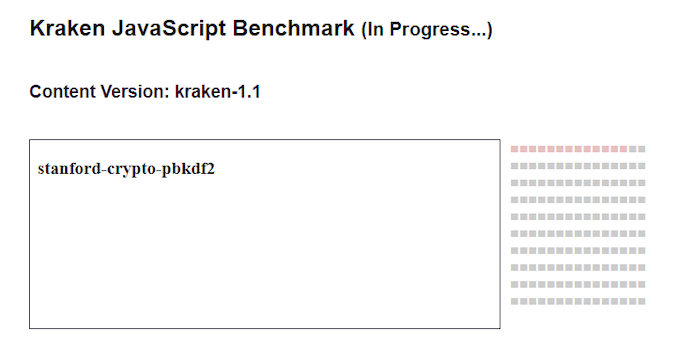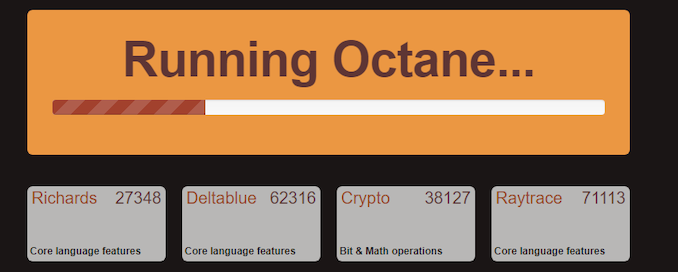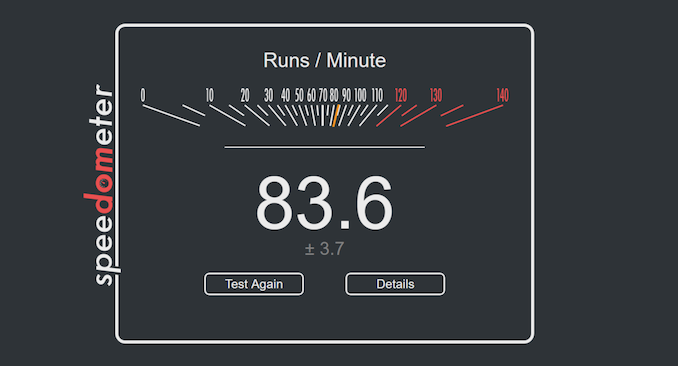Intel 11th Generation Core Tiger Lake-H Performance Review: Fast and Power Hungry
by Brett Howse & Andrei Frumusanu on May 17, 2021 9:00 AM EST- Posted in
- CPUs
- Intel
- 10nm
- Willow Cove
- SuperFin
- 11th Gen
- Tiger Lake-H
CPU Tests: Legacy and Web
In order to gather data to compare with older benchmarks, we are still keeping a number of tests under our ‘legacy’ section. This includes all the former major versions of CineBench (R15, R11.5, R10) as well as x264 HD 3.0 and the first very naïve version of 3DPM v2.1. We won’t be transferring the data over from the old testing into Bench, otherwise it would be populated with 200 CPUs with only one data point, so it will fill up as we test more CPUs like the others.
The other section here is our web tests.
Web Tests: Kraken, Octane, and Speedometer
Benchmarking using web tools is always a bit difficult. Browsers change almost daily, and the way the web is used changes even quicker. While there is some scope for advanced computational based benchmarks, most users care about responsiveness, which requires a strong back-end to work quickly to provide on the front-end. The benchmarks we chose for our web tests are essentially industry standards – at least once upon a time.
It should be noted that for each test, the browser is closed and re-opened a new with a fresh cache. We use a fixed Chromium version for our tests with the update capabilities removed to ensure consistency.
Mozilla Kraken 1.1
Kraken is a 2010 benchmark from Mozilla and does a series of JavaScript tests. These tests are a little more involved than previous tests, looking at artificial intelligence, audio manipulation, image manipulation, json parsing, and cryptographic functions. The benchmark starts with an initial download of data for the audio and imaging, and then runs through 10 times giving a timed result.
We loop through the 10-run test four times (so that’s a total of 40 runs), and average the four end-results. The result is given as time to complete the test, and we’re reaching a slow asymptotic limit with regards the highest IPC processors.

Google Octane 2.0
Our second test is also JavaScript based, but uses a lot more variation of newer JS techniques, such as object-oriented programming, kernel simulation, object creation/destruction, garbage collection, array manipulations, compiler latency and code execution.
Octane was developed after the discontinuation of other tests, with the goal of being more web-like than previous tests. It has been a popular benchmark, making it an obvious target for optimizations in the JavaScript engines. Ultimately it was retired in early 2017 due to this, although it is still widely used as a tool to determine general CPU performance in a number of web tasks.

Speedometer 2: JavaScript Frameworks
Our newest web test is Speedometer 2, which is a test over a series of JavaScript frameworks to do three simple things: built a list, enable each item in the list, and remove the list. All the frameworks implement the same visual cues, but obviously apply them from different coding angles.
Our test goes through the list of frameworks, and produces a final score indicative of ‘rpm’, one of the benchmarks internal metrics.
We repeat over the benchmark for a dozen loops, taking the average of the last five.

Legacy Tests

















229 Comments
View All Comments
boozed - Monday, May 17, 2021 - link
"Power Hungry" lol shock mesellappa - Monday, May 17, 2021 - link
Searched for "battery life" and couldn't find it. Waiting for battery life data.Brett Howse - Monday, May 17, 2021 - link
This is an engineering sample. We won't be doing battery life testing on it.mode_13h - Monday, May 17, 2021 - link
> This is an engineering sample. We won't be doing battery life testing on it.WTF? You mean the CPU isn't final production-run? If so, why is this labelled a "review" and not a "preview"?
Dolda2000 - Monday, May 17, 2021 - link
The laptop is an engineering sample, not the CPU.Andrei Frumusanu - Tuesday, May 18, 2021 - link
We purposefully called it "Performance Review" of the CPU in the title.The laptop itself is generally irrelevant as you will not be able to buy it, besides the fact that it's a an engineering sample.
mode_13h - Tuesday, May 18, 2021 - link
> it's a an engineering sample.Do you use the terms "engineering sample" and "reference design" interchangeably, or is there a significant distinction?
mode_13h - Tuesday, May 18, 2021 - link
FWIW, I think there *is* a distinction and that the laptop is really a reference design. If Intel were selling their own laptops, then you could call a pre-release laptop an "engineering sample". If it's just a demonstration vehicle for their chips, then it's a "reference design".Where the waters could get muddy is if Intel's lawyers have a lot of scary contracts threatening to sue you into oblivion if you sell on an engineering sample, as sometimes happens. And maybe they just chose to call the laptop an "engineering sample", so they could reuse those same legal agreements, rather than having to edit them so they instead apply to its reference boards/laptops.
isthisavailable - Monday, May 17, 2021 - link
AMD clearly has the "flagship" laptop CPU yet Intel still has the audacity to make new high end laptops exclusive to their processors by bribing OEMs.Spunjji - Tuesday, May 18, 2021 - link
To be fair, some of the OEMs do not seem to require any bribery.